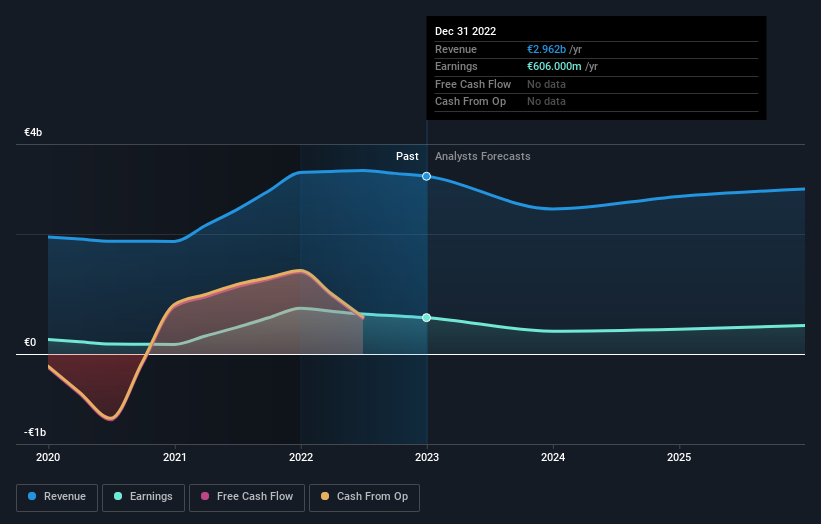- France
- /
- Capital Markets
- /
- ENXTPA:ROTH
Individual investors own 32% of Rothschild & Co SCA (EPA:ROTH) shares but private companies control 57% of the company

Key Insights
- Significant control over Rothschild & Co by private companies implies that the general public has more power to influence management and governance-related decisions
- 52% of the business is held by the top 3 shareholders
- Ownership research along with analyst forecasts data help provide a good understanding of opportunities in a stock
Every investor in Rothschild & Co SCA (EPA:ROTH) should be aware of the most powerful shareholder groups. With 57% stake, private companies possess the maximum shares in the company. That is, the group stands to benefit the most if the stock rises (or lose the most if there is a downturn).
Meanwhile, individual investors make up 32% of the company’s shareholders.
In the chart below, we zoom in on the different ownership groups of Rothschild & Co.
See our latest analysis for Rothschild & Co

What Does The Institutional Ownership Tell Us About Rothschild & Co?
Institutional investors commonly compare their own returns to the returns of a commonly followed index. So they generally do consider buying larger companies that are included in the relevant benchmark index.
Rothschild & Co already has institutions on the share registry. Indeed, they own a respectable stake in the company. This suggests some credibility amongst professional investors. But we can't rely on that fact alone since institutions make bad investments sometimes, just like everyone does. When multiple institutions own a stock, there's always a risk that they are in a 'crowded trade'. When such a trade goes wrong, multiple parties may compete to sell stock fast. This risk is higher in a company without a history of growth. You can see Rothschild & Co's historic earnings and revenue below, but keep in mind there's always more to the story.

Rothschild & Co is not owned by hedge funds. The company's largest shareholder is Edmond de Rothschild Holding S.A., with ownership of 40%. In comparison, the second and third largest shareholders hold about 5.7% and 5.5% of the stock.
To make our study more interesting, we found that the top 3 shareholders have a majority ownership in the company, meaning that they are powerful enough to influence the decisions of the company.
Researching institutional ownership is a good way to gauge and filter a stock's expected performance. The same can be achieved by studying analyst sentiments. Quite a few analysts cover the stock, so you could look into forecast growth quite easily.
Insider Ownership Of Rothschild & Co
While the precise definition of an insider can be subjective, almost everyone considers board members to be insiders. Company management run the business, but the CEO will answer to the board, even if he or she is a member of it.
I generally consider insider ownership to be a good thing. However, on some occasions it makes it more difficult for other shareholders to hold the board accountable for decisions.
Our most recent data indicates that insiders own some shares in Rothschild & Co SCA. The insiders have a meaningful stake worth €71m. Most would see this as a real positive. If you would like to explore the question of insider alignment, you can click here to see if insiders have been buying or selling.
General Public Ownership
The general public, who are usually individual investors, hold a 32% stake in Rothschild & Co. While this size of ownership may not be enough to sway a policy decision in their favour, they can still make a collective impact on company policies.
Private Company Ownership
It seems that Private Companies own 57%, of the Rothschild & Co stock. It might be worth looking deeper into this. If related parties, such as insiders, have an interest in one of these private companies, that should be disclosed in the annual report. Private companies may also have a strategic interest in the company.
Next Steps:
While it is well worth considering the different groups that own a company, there are other factors that are even more important. Take risks for example - Rothschild & Co has 2 warning signs (and 1 which is a bit unpleasant) we think you should know about.
If you would prefer discover what analysts are predicting in terms of future growth, do not miss this free report on analyst forecasts.
NB: Figures in this article are calculated using data from the last twelve months, which refer to the 12-month period ending on the last date of the month the financial statement is dated. This may not be consistent with full year annual report figures.
New: AI Stock Screener & Alerts
Our new AI Stock Screener scans the market every day to uncover opportunities.
• Dividend Powerhouses (3%+ Yield)
• Undervalued Small Caps with Insider Buying
• High growth Tech and AI Companies
Or build your own from over 50 metrics.
Have feedback on this article? Concerned about the content? Get in touch with us directly. Alternatively, email editorial-team (at) simplywallst.com.
This article by Simply Wall St is general in nature. We provide commentary based on historical data and analyst forecasts only using an unbiased methodology and our articles are not intended to be financial advice. It does not constitute a recommendation to buy or sell any stock, and does not take account of your objectives, or your financial situation. We aim to bring you long-term focused analysis driven by fundamental data. Note that our analysis may not factor in the latest price-sensitive company announcements or qualitative material. Simply Wall St has no position in any stocks mentioned.
About ENXTPA:ROTH
Rothschild & Co
Rothschild & Co SCA provides global advisory, wealth and asset management, and merchant banking services in France, the United Kingdom, the Channel Islands, the Americas, rest of Europe, Switzerland, Australia, Asia, and internationally.
Undervalued with adequate balance sheet.
Similar Companies
Market Insights
Community Narratives




